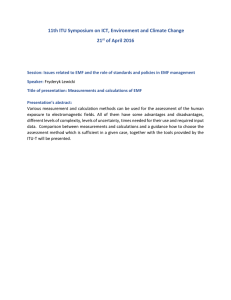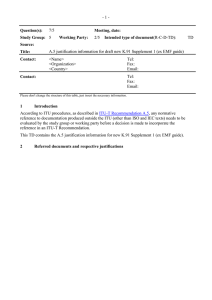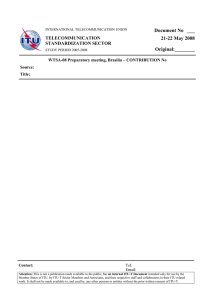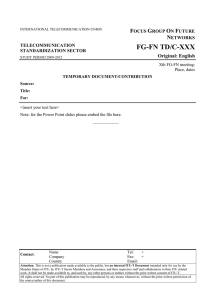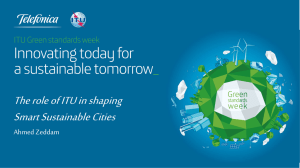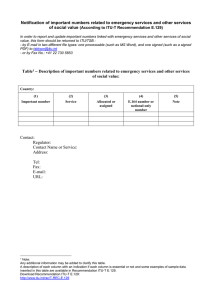Overview of ITU-T's activities on EMF ITU Regional Standardization Forum For Africa
advertisement
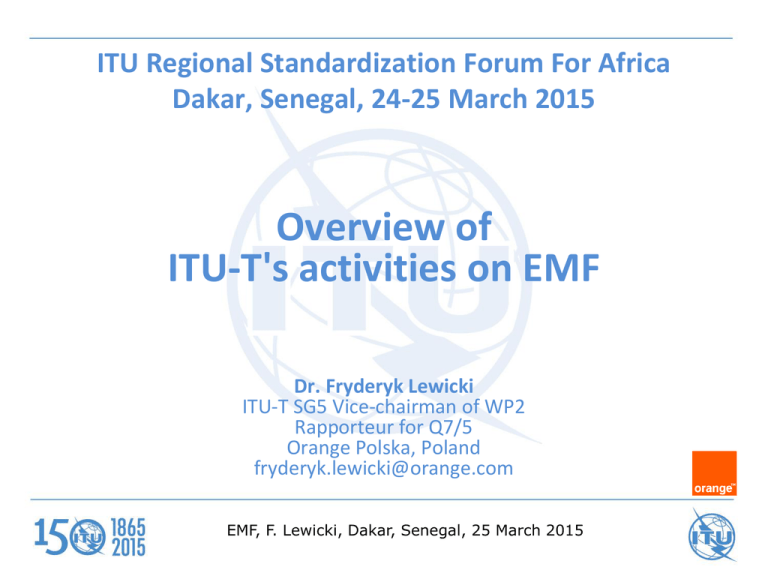
ITU Regional Standardization Forum For Africa Dakar, Senegal, 24-25 March 2015 Overview of ITU-T's activities on EMF Dr. Fryderyk Lewicki ITU-T SG5 Vice-chairman of WP2 Rapporteur for Q7/5 Orange Polska, Poland fryderyk.lewicki@orange.com EMF, F. Lewicki, Dakar, Senegal, 25 March 2015 The issue… The electromagnetic fields are unknown and undetectable for people… 7,1 billions of mobile subscriptions were in 2014 Lack of regulation and/or non-compliance... In 2014 global mobile penetration reached 97% Lack of communication and information to citizens… It can generate a lack of trust, which may become fear… Regulations for non-ionizing radiations Exposure standards: Specifications that limit the exposure of people to electromagnetic fields (EMF) Emission standards: Specifications that limit the emission of electromagnetic fields (EMF) from the devices ITU-T Study Group 5 Leading study group for: electromagnetic compatibility and electromagnetic effects Question 12 Terminology WP1/5 Damage prevention and safety 7 Questions WP3/5 ICT and climate change 4 Questions Question 20 Smart sustainable cities and communities WP2/5 Electromagnetic fields: emission, immunity and human exposure 6 Questions Q7/5 Human exposure to electromagnetic fields (EMFs) due to radio systems and mobile equipment Question 7/5 Human exposure to electromagnetic fields (EMFs) due to radio systems and mobile equipment Main study area: Real site measurements and modeling of the multiple sources operating on different frequencies and transmitting antennas Determine the validity of electromagnetic field predictions Procedures and guidance on numerical modeling of EMFs in the areas around telecommunication transmitting antennas and various systems Guidance based on existing SAR measuring and calculating procedures, techniques and protocols for evaluating EMF due to ICT equipment Handbook to answer frequently asked questions about human exposure to EMF Question 7/5 Human exposure to electromagnetic fields (EMFs) due to radio systems and mobile equipment Main tasks: Develop Recommendations for the telecommunication sector Implement the mandate of the ITU Resolutions on EMF; especially a support to developing countries according to ITU-T Resolution 72 (WTSA-12, Dubai, 20-29 November 2012) Best practice and mitigation techniques in the protection against non-ionizing radiation Collaboration with other standardization bodies (IEC, CENELEC, WHO) in order to avoid duplication of work Maintenance and enhancement of the existing Recommendations ITU-T SG5 Focus Group on Smart Sustainable Cities (FG-SSC) The range of devices that are connected to the internet is rapidly growing In most cases the connection is wireless – it means that the devices have to radiate electromagnetic fields (EMF) FG-SSC includes a Technical Report on “EMF considerations in smart sustainable cities” The design and deployment of wireless networks must ensure electromagnetic field (EMF) compliance and minimize human exposure to radio frequency (RF) radiation EMF considerations in smart sustainable cities have to ensure the networks and connected devices operate safely and most efficiently itu.int/en/ITU-T/focusgroups/ssc/Pages/default.aspx Typical EMF assessment Safety EMF compliance at sites Occupational Health & Safety (OH&S) for workers and public Environmental Radio signals in the community Educational & informative EMF assessment methods Calculations or measurements? There are many methods to show the compliance National regulations are most important EMF assessment method depends on site & environment Calculations - suitable in many cases, & have significant benefits - accurate, fast & cost effective, possible for the sources not in operation yet Measurements - required in very complex environments, difficulty to take into account the time variation, the presence of staff and equipment may influence the results The simplest method is recommended to be applied first, even if other methods are more accurate More sophisticated (and accurate) methods should be used if no compliance is observed by less sophisticated (and accurate) method ITU-T Recommendations - guidance on both calculation and measurements EMF assessment methods Field monitoring EMF fields are unknown to general public The confidence can be achieved thanks to the control of the EMF by taking continuous measurements and having a proper communication (for example websites) The balance between costs and accuracy is very important (broadband and frequency selective measurement) ITU-T Recommendations – cover field monitoring too ITU-T Recommendations for EMF assessment Recommendation ITU-T K.52 (2000/2014) - Guidance on complying with limits for human exposure to electromagnetic fields – includes „K.52calculator software” Recommendation ITU-T K.61 (2003/2008) - Guidance on measurement and numerical prediction of electromagnetic fields for compliance with human exposure limits for telecommunication installations Recommendation ITU-T K.70 (2007/2014) - Mitigation techniques to limit human exposure to EMFs in the vicinity of radiocommunication stations – includes „EMF Estimator software” Recommendation ITU-T K.83 (2011/2014) - Monitoring of electromagnetic field levels ITU-T Recommendations for EMF assessment Recommendation ITU-T K.90 (2012) - Evaluation techniques and working procedures for compliance with limits to power-frequency (DC, 50 Hz, and 60 Hz), electromagnetic field exposure of network operator personnel – includes EMFACDC software Recommendation ITU-T K.91 (2012/2014) - Guidance for assessment, evaluation and monitoring of human exposure to radio frequency electromagnetic fields – includes „Uncertainty calculator” and „Watt_Guard” software and Supplement „EMF-guide” Recommendation ITU-T K.100 (2014) - Measurement of radio frequency electromagnetic fields to determine compliance with human exposure limits when a base station is put into service Highlights on deliverables Recommendation ITU-T K. 52 aims to help with compliance with safety limits for human exposure to EMFs Provides guidance on calculation method, and installation assessment procedure Is based on safety limits provided by ICNIRP Determines the likelihood of installation compliance based on accessibility criteria, antenna properties and emitter power K52calculator is a software for simplification of calculations Recommends IEC Standard for the compliance measurement of mobile handsets. Highlights on deliverables - continued Recommendation ITU-T K. 61 helps telecommunication operators to verify compliance with exposure standards promulgated by local or national authorities Provides guidance on measurement methods that can be used to achieve a compliance assessment Provides guidance on the selection of numerical methods suitable for exposure prediction in various situations Highlights on deliverables - continued Recommendation ITU-T K. 70 defines techniques which can be used by telecommunication operators to evaluate the cumulative (total) exposure ratio in the vicinity of transmitting antennas and to identify the main source of radiation Provides guidance on mitigation methods which allow reduction of radiation level Provides guidance on procedures necessary in the environment (on site) in which, in most cases, there is a simultaneous exposure to multiple frequencies from many different sources Includes a software that implements the methodology: EMF estimator Highlights on deliverables - continued EMF-estimator is the Annex I to the ITU-T Recommendation K.70 The last version of the software (12.2014) can be loaded from the: http://www.itu.int/ITUT/recommendations/rec.aspx?rec=9140 EMF-estimator is offered by ITU-T since 06.2007 It is periodically updated / expanded according to the needs (in 2009, 2011, 2013 and 2014) The main new options are: The line of calculation can be oriented in any direction There is a possibility to put results on the Google Maps Many projects can be opened in parallel Highlights on deliverables - continued Recommendation ITU-T K.83 provides guidance on how to make long-term measurements and monitoring of EMF in the selected areas that are under public concern, in order to show that EMFs are under control and under the limits The balance between costs and accuracy is very important (broadband and frequency selective measurement) Implementation of Recommendation ITU-T K.83 "Monitoring of electromagnetic field levels" in countries (e.g. Argentina, Brazil, Colombia, Ecuador, El Salvador and Uruguay) Highlights on deliverables - continued Recommendation ITU-T K.90 provides guidance on the compliance with safety limits for the personnel in the vicinity of power supply lines of medium-voltage (MV) and high-voltage (HV) power lines at power frequencies (DC, 50 Hz, and 60 Hz), concerning EMF exposure It includes software: EMFACDC Highlights on deliverables - continued Recommendation ITU-T K.91 provides guidance on how to assess and monitor human exposure to radio frequency (RF) electromagnetic fields (EMF) in areas with surrounding radio communication installations based on existing exposure and compliance standards in the frequency range of 8,3 kHz to 300 GHz includes software „Uncertainty calculator” Includes software „Watt_Guard” – for EMF level assessment in the vicinity of Radio Amateur installations Highlights on deliverables - continued Guide on electromagnetic fields and health (Supplement 1 to Recommendation ITU-T K.91) Answers to typical questions asked by the public on EMF, and to address typical misunderstandings on EMF matters in the society Provides education and information: promoting EMF information and education resources suitable for all communities, stakeholders and governments Supports clarification of the science: referencing the WHO and other stakeholders Provides information most useful in helping clarify uncertainties concerning EMF Highlights on deliverables - continued Recommendation ITU-T K.100 provides guidance on how to measure radio frequency electromagnetic fields in order to determine compliance with human exposure limits when a base station is put into service Simplified assessment procedures to identify those installations which are known to be compliant with EMF exposure limits without measurements Deliverables under study Recommendation ITU-T K.env - Guidance on the Environmental Management for Electromagnetic Radiation from Radiocommunication Base Stations Recommendation ITU-T K.maps - Maps of the RF EMF EMF flyer and website Conclusions Compliance with EMF exposure limits is a substantial factor in smart sustainable cities development Good communication with public is a very important task Efficient deployment of wireless infrastructure reduces the RF EMF from networks and devices ITU’s guidance can be helpful in smooth and safe implementation of wireless systems ITU-T/SG5 “Environment & Climate Change” itu.int/go/tsg5 ITU-T/SG5 Series K Recommendations (free of charge) itu.int/ITU-T/recommendations/index_sg.aspx?sg=5 ITU-T and EMF itu.int/go/emfs Thank you
